| Srl | Item |
| 1 |
ID:
094851
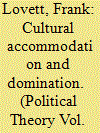

|
|
|
|
|
| Publication |
2010.
|
| Summary/Abstract |
When should burdened social practices be granted special accommodation? One issue of concern-raised by Okin and others-is that some social practices involve domination, and so the accommodation of those practices might (inadvertently, perhaps) support social injustice. Suppose one wants to take this concern very seriously. Starting from the assumption that freedom from domination is an especially important value, this article examines whether cultural accommodation would ever be advisable. Approaching the problem of multicultural accommodation from this point of view greatly clarifies the debate and yields some interesting results. In particular, the discussion concludes that there are circumstances under which the goal of minimizing domination itself would be furthered by policies of special accommodation.
|
|
|
|
|
|
|
|
|
|
|
|
|
|
|
|
| 2 |
ID:
093581
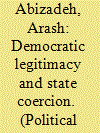

|
|
|
| 3 |
ID:
093578


|
|
|
|
|
| Publication |
2010.
|
| Summary/Abstract |
Recent scholarship on John Stuart Mill has illuminated his arguments about the normative legitimacy of imperial rule. However, it has tended to ignore or downplay his extensive writings on settler colonialism: the attempt to create permanent "civilized" communities, mainly in North America and the South Pacific. Mill defended colonization throughout his life, although his arguments about its character and justification shifted over time. While initially he regarded it as a solution to the "social problem" in Britain, he increasingly came to argue that its legitimacy resided in the universal benefits-civilization, peace, and prosperity-it generated for humanity. In the final years of his life Mill seemed to lose faith in the project. Finally recognizing the prevalence of colonial violence and the difficulty of realizing his grand ambitions, yet refusing to give up on colonization altogether, his colonial romance gave way to a form of melancholia
|
|
|
|
|
|
|
|
|
|
|
|
|
|
|
|
| 4 |
ID:
094850
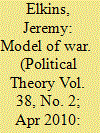

|
|
|
|
|
| Publication |
2010.
|
| Summary/Abstract |
During the past half-century, the United States has declared war on (among else) poverty, cancer, crime, drugs, and terrorism. This essay examines, in the context of these, war as a model for responding to domestic political problems and focuses on the role that that model has played in representing the state and its relation to those evils identified as the enemy.
|
|
|
|
|
|
|
|
|
|
|
|
|
|
|
|
| 5 |
ID:
093583


|
|
|
| 6 |
ID:
093582
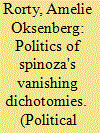

|
|
|
|
|
| Publication |
2010.
|
| Summary/Abstract |
Spinoza's project of showing how the mind can be freed from its passive affects and the State from its divisive factions (E IV.Appendix and V.Preface) ultimately coincides with the aims announced in the subtitle of the Tractatus-Theologico-Politicus (TTP) "to demonstrate that [the] freedom to philosophize does not endanger the piety and obedience required for civic peace."1 Both projects rest on a set of provisional isomorphic distinctions-between adequate and inadequate ideas, between reason and the imagination, between active and passive affects-that Spinoza proceeds to blur, and indeed to renounce. In using these distinctions while also moving to overcome them, Spinoza is not confused or indecisive. Every philosopher, every wise Sovereign, every free man who attempts to incorporate adequate ideas in inadequately framed, perspectivally limited contexts must use these distinctions and also see how deeply misleading they are. I want to offer a friendly amendment to Hasana Sharpe's essay "The Force of Ideas in Spinoza" arguing that Spinoza refuses her distinction between the force of an idea and its truth.2
|
|
|
|
|
|
|
|
|
|
|
|
|
|
|
|
| 7 |
ID:
093577


|
|
|
|
|
| Publication |
2010.
|
| Summary/Abstract |
Benjamin Constant's famous lecture comparing ancient and modern liberty can be better understood if it is read alongside a set of unpublished lectures on ancient religion that he delivered one year earlier. Those lectures suggest that Constant's commitment to modern liberty was based in part on his deep anxieties about religious freedom, and that he valued religious freedom because he thought the "religious sentiment" was an important manifestation of a natural human capacity for self-development. In putting religion and self-development at the heart of his vision, he tried to show that modern liberty could have a positive moral or spiritual purpose beyond merely assuring people freedom from interference in the pursuit of their interests.
|
|
|
|
|
|
|
|
|
|
|
|
|
|
|
|
| 8 |
ID:
094849
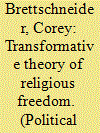

|
|
|
|
|
| Publication |
2010.
|
| Summary/Abstract |
Religious freedom is often thought to protect, not only religious practices, but also the underlying religious beliefs of citizens. But what should be said about religious beliefs that oppose religious freedom itself or that deny the concept of equal citizenship? The author argues here that such beliefs, while protected against coercive sanction, are rightly subject to attempts at transformation by the state in its expressive capacities. Transformation is entailed by a commitment to publicizing the reasons and principles that justify the basic rights of citizens.
|
|
|
|
|
|
|
|
|
|
|
|
|
|
|
|
| 9 |
ID:
093579


|
|
|
|
|
| Publication |
2010.
|
| Summary/Abstract |
This paper analyzes critically the appeal the unpolitical is enjoying among contemporary political philosophers who are democracy's friends. Unlike a radical critique of democracy, what I propose to call "criticism from within," takes the form of dissatisfaction with the erosion of an independent mind and impartial judgment per effect of the partisan character of democratic politics. This paper proposes three main criticisms of the actual trend toward unpolitical views of democracy: the first points to the strategic use of deliberation as an antidote against democratic procedures themselves (like voting and majority rule); the second to the negative conception of democracy that the unpolitical aspiration makes visible; and the third to the dissolution of political judgment within a model of judgment that is tailored around justice.
|
|
|
|
|
|
|
|
|
|
|
|
|
|
|
|
| 10 |
ID:
093580


|
|
|
|
|
| Publication |
2010.
|
| Summary/Abstract |
Abizadeh has argued that because border controls coerce would-be immigrants and invade their autonomy, they are entitled to participate in the democratic institutions that impose those controls. In reply, the author distinguishes between coercion and prevention, shows that prevention need not undermine autonomy, and concludes that although border controls may restrict freedom, they do not give rise to democratic entitlements.
|
|
|
|
|
|
|
|
|
|
|
|
|
|
|
|